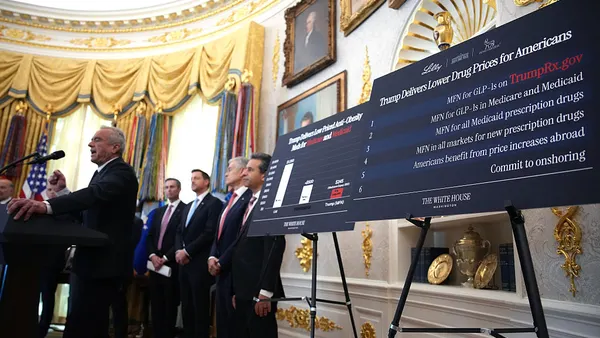52 Aug u s t 20 03 PharmaVOICE PHARMA TRAX SALES, MARKETING, AND R&D TRENDS AFFECTING THE HEALTHCARE INDUSTRY Patient Recruitment Hindered by TIME CONSTRAINTS Clinical research coordinators (CRCs) spend most of their time managing administrative, data, and reg ulatory requirements of studies. A survey of CRCs, conducted by BBK Healthcare Inc., reveals that CRCs devote only 13% of their day to finding patients — 8% to patient recruitment activities and5% to search ing medical records for potential study subjects. The BBK survey was distributed in April 2003 via email to a nationwide list of about 3,330 CRCs. In total, 353 CRCs completed the survey’s 75 questions. “CRCs play a pivotal role in creating a strong investigative site,” says Joan F. Bachenheimer, CEO of BBK. “But because CRCs must allocate their time to multiple tasks necessary to fulfill their jobs, patient recruitment and outreach initiatives that are used to maximize study enrollment are not being given enough time and attention.” In addition, only 24% of the CRC respon dents indicated that they had received any initial training relating to patientoutreach techniques. CRCs feel positively about their working relationships with principal investi gators (PIs), level of job satisfaction, and employment turnover rates.When asked to reflect on the working relationship between themselves and PIs, 91% of CRCs said they enjoy an open and responsive relationship with the PIs and that they feel this relationship positively affects patient recruitment activities. FOCUS ON CUSTOMERS Needed for Success To succeed in the years ahead, pharmaceutical companies must forge stronger relationships and become more keenly focused on the needs of their customers — physicians, patients, and payers — by taking a new approach to marketing and sales.This is the finding of research done by Cap Gemini Ernst & Young in association with Insead,a business school. The study found that an increasingly competi tive industry landscape, a shrinking pipeline of new products,and a tougher regulatory climate have cre ated an environment in which pharma companies must enhance their products with services (i.e., infor mation, education, and administrative support) and tailor communications to connect with different customer segments. The study found that while physicians remain pharmaceutical manufacturer’s most important customers, more consumers are becoming proac tive in their quest for information and interaction with pharmaceutical companies. In addition, payer influence — from managedcare organizations, employers, and government — on reimbursement caps and prescribing choices is growing. The third annual CGE&Y/Insead global vision and reality study, Prescriptions for the Smart and Lean Pharmaceutical Company, was conducted from January to May 2003 among more than 5,500 individuals — 4,042 consumers, 1,421 physicians, 76 pharmaceutical executives, and 33 payer organiza tions — across 15 countries, including North Ameri ca, France, United Kingdom,and Germany. SALES REPVALUE TO PHYSICIANS Found to be Low Accel Healthcare Communications has released The Accel Report — Through Our Customers’ Eyes: The Physician Speaks Out.The report is the result of an analysis of 125 primarycare physicians’ interac tions with pharmaceutical sales representatives. The results were obtained through a quantitative and qualitative online survey conducted by Accel, which targeted primarycare physicians across the United States. 51% of U.S. physicians surveyed say they still trust pharmaceutical companies;but PHYSICIANSWANT ANDNEEDCHANGE 38% of physicians surveyed HAVE CONSCIOUSLY DECIDEDTO MAKE LESS TIME FOR PHARMA SALES REPS than they did two years ago 65% of physicians WORRYTHAT PHARMA COMPANIES DONOTKEEPTHEM ADEQUATELY INFORMED about the messages they send to patients in consumer communications, i.e., directtoconsumer advertising Rather than being “sold to,” DOCTORSWANT MOREDETAILED SCIENTIFIC ANDMEDICAL INFORMATION on drug side effects and interactions (without a marketing bias) 57% of respondents would MAKEMORE TIME FORVISITS IF SALES REPS PROVIDED AVALUEADDED SERVICE, such as educational materials for patients or practice management support (administration, training, etc.) 39% of U.S. respondents WANTMORE INTERACTION with the pharmaceutical industry, more information in general (68%), or to find out about new medicines and treatments (58%) 35% of U.S. consumers report REQUESTING A SPECIFIC DRUG from their physician, compared with 47% in Germany and 26% in the United Kingdom THETRADITIONALLY ADVERSARIAL RELATIONSHIP BETWEEN PHARMACEUTICAL COMPANIES AND PAYERS SHOULDCHANGE to one of collaboration in an increasingly interdependent,networked world of healthcare PHARMACEUTICAL COMPANIES SHOULD ASSUMEGREATER INVOLVEMENT IN MARKETDEVELOPMENT programs as well as diseasemanagement and population healthmanagement programs,despite previous pitfalls Source: Cap Gemini Ernst &Young,NewYork.For more information, visit cgey.com. STRONGER CUSTOMER RELATIONSHIPS NEEDED CRC’S DAILY ACTIVITIES PHARMA trax The survey found that half of reps are turned away and those who did make it to see the doc tor are not given much time. Doctors also don’t have a positive perception about sales reps. In fact, respondents say reps have gone from being collegial to having purely a sales orientation. Use of SMOs Can SPEED CLINICAL DEVELOPMENT A recent Fast Track Systems study reveals that clinical trials conducted through site manage ment organizations (SMOs) finish an average of three weeks faster than those conducted through nonSMO sites. Fast Track Systems’ findings reflect the market’s growing awareness of the economic benefits of using SMOs.The study also found even faster times to completion for studies when SMOs have a high share of sites or patients within a trial, and still faster times when a single SMO is used to manage all or most patients and sites for a trial. “My extensive study of industry benchmarking data shows that more and more sponsors are using SMOs to accelerate trials; along with solid protocol design and a better, more accurate budget, these companies can ultimately bring newdrugs to market faster and at a lower cost,” says Ariel Fishman, a Columbia Business School Ph.D. candidate who undertook the study. Data used in the study included information from about 3,000 clinical trials using SMOs and non SMO sites between 1993 and 2001. The data were provided by Fast Track Systems from a library of industry clinicaltrials contract data. The library is part of Fast Track’s TrialSpace Grants Manager,a benchmarking and budgeting application that allows contract professionals to predict, manage, andnegotiate investigator costs andbudgets for trials. 43% of the 85,000 sales representatives in the United States DON’T GET PASTTHE RECEPTIONIST’S DESK Of those who get to see the doctor, the average time spent is TWOMINUTESTO THREE MINUTES About 60% of doctors FELTTHE REPRESENTATIVESWEREYOUNGER AND MOREAGGRESSIVE than in the past About 20% of doctors thought the representatives were LESS INFORMED AND MORERUSHED 92% of doctors said they SEE REPRESENTATIVES ONLYTOGET SAMPLES Most doctors indicated that WITHOUT SAMPLESTHEYWOULDONLYSEE10% of representatives,as opposed to the current 57% 62% of doctors indicated they WANTTO RECEIVE BALANCED INFORMATION that they can trust, but only 6% said that they received such information from sales representatives Most doctors want NEW,PERTINENT, RELIABLE,TIMELY,AND UNBIASED INFOR MATION about products and the medical industry but felt that LESSTHAN 50% of representatives provide this data to them 78% of doctors PREFER LEARNING FROM PEERS OR FORUMS rather than from sales representatives The majority of doctors APPROVEOF RECEIVING EMAIL UPDATES of important or new information 58.4% of physicians DONOTBELIEVE SALES REPS PROVIDE USEFUL INDUSTRY INFORMATION Source: Accel Healthcare Communications LLC, New York. For more information, visit accelhealth.com. PHYSICIANS SPEAK OUT ACCEL HEALTHCARE COMMUNICATIONS LLC,NewYork, is a healthcare advertising agency whose mission is to provide creative, strategically sound,and scientifically rigorous executions.For more information, visit accelhealth.com. BBK HEALTHCARE INC., Newton,Mass., is a fullservice patientrecruitment consulting firm. Services provided include strategic consultation, investigative site recruitment, Follow up and patient recruitment.For more information, visit bbkhealthcare.com. CAPGEMINI ERNST &YOUNGGROUP, NewYork,provides consulting, technology, and outsourcing services. For more information, visit cgey.com. FASTTRACK SYSTEMS,San Mateo,Calif., a clinicaldevelopment optimization compa ny, offers a datadriven systems approach to expediting clinicaltrial design, setup, and execution.For more information, visit fasttrack.com.
An article from










